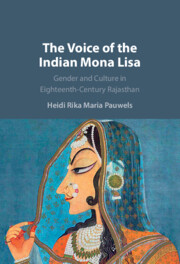Book contents
- The Voice of the Indian Mona Lisa
- The Voice of the Indian Mona Lisa
- Copyright page
- Contents
- Figures
- Acknowledgments
- Note on the Text
- Abbreviations
- Introduction
- 1 The Making of the “Indian Mona Lisa”
- 2 The Queen and the Slave Girl
- 3 Becoming the Prince’s Concubine
- 4 Synergies of the Literary Couple
- 5 Legacy: Self-Fashioning and Its Limits
- Conclusions
- Appendix: Sources
- References
- Index
4 - Synergies of the Literary Couple
Published online by Cambridge University Press: 17 August 2023
- The Voice of the Indian Mona Lisa
- The Voice of the Indian Mona Lisa
- Copyright page
- Contents
- Figures
- Acknowledgments
- Note on the Text
- Abbreviations
- Introduction
- 1 The Making of the “Indian Mona Lisa”
- 2 The Queen and the Slave Girl
- 3 Becoming the Prince’s Concubine
- 4 Synergies of the Literary Couple
- 5 Legacy: Self-Fashioning and Its Limits
- Conclusions
- Appendix: Sources
- References
- Index
Summary
Chapter 4 foregrounds Rasikbihari’s songs, documenting her contributions to Kishangarhi literary production. They are preserved overwhelmingly in conjunction with Nagaridas’, which allows for studying up close the synergy of the early-modern literary couple. First are featured her debut songs for a poetic symposium that the prince organized during the monsoon of 1742. Intertextual analysis of the poetic interchanges that took place there reveals that she was taken seriously as a poetess in her own right, also by other courtier-poets present. Next are featured the exchanges in recitals through the seasons, as can be traced from his liturgical anthology for temple festivals and thematically arranged celebrations of intimate moments, which pertain more to the genre of courtesan songs. The scope of poetic interchange extended also more broadly, as both referenced earlier devotional songs, including those by the sixteenth-century devotee-princess, Mirabai. The couple also responded to the new Urdu (Rekhta), rage in Delhi, experimented with Punjabi, and the musical genres of Khayāl and Kabitt. In poetic analysis surfaces the complex issue of their gendered personhood in performance, as he composed frequently from the perspective of a female admirer of Krishna, just like she did. She may well have been his muse in some of these trends.
Keywords
- Type
- Chapter
- Information
- The Voice of the Indian Mona LisaGender and Culture in Eighteenth-Century Rajasthan, pp. 138 - 189Publisher: Cambridge University PressPrint publication year: 2023



